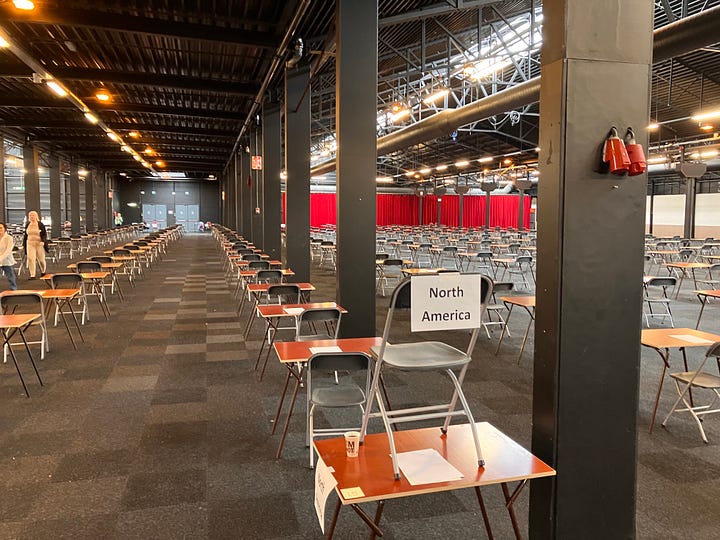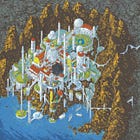20. Although the villagers had forgotten the ritual and lost the original black box, they still remembered to use stones.
Shirley Jackson, "The Lottery"(1948)
Last week:
This week: Shirley Jackson, “The Lottery” (1948)
Next week: Kate Chopin, The Awakening (1899)
I’m writing to you today from the exam hall, a ritual that for many departments marks the beginning of summer. I haven’t held an exam in person in many years, and I end most of my classes with final papers, rather than exams. But this year, based on the advent of Chat GPT usage on online exams (!) and a heavy dose of post-Covid online quiz fatigue, the International Studies department brought back the old rituals of exams on paper. I give 6 lectures in the “Cultures and Language of North America,” a team taught required course in the major, so I’m here, too, soaking in the tension.




Given the remote location of the conference hall, the entire 17 tram on the way here was full of students for our exams, cramming. Heavily highlighted notebooks and coffee in bulk.
“You may begin” Pencils up.
Bathroom checks.
Students seated in halls in rows.
Senior citizens as invigilators walking up and down the rows.
Pencils down.
Relief or anguish.
Seeing my student’s grin just now as he submitted his essay and then walked off into his summer break, liberated, joyous — well, that was worth the trek.
This week’s story stages an annual ritual of stress and release. In Shirley Jackson’s (1916-1965) “The Lottery,” the townspeople gather on June 27 every year to undergo the lottery, a ritual that ends badly for one of them.
Jackson published the story in The New Yorker, in June of 1948. (There’s an audio version at the link, go check it out before I spoil the ending for you in a few.) People loved and hated the way that the horror of this story sneaks up on you. The story is narrated in such a way to lull us into acceptance. Check out this opener:
The morning of June 27th was clear and sunny, with the fresh warmth of a full-summer day; the flowers were blossoming profusely and the grass was richly green. The people of the village began to gather in the square, between the post office and the bank, around ten o’clock; in some towns there were so many people that the lottery took two days and had to be started on June 26th, but in this village, where there were only about three hundred people, the whole lottery took only about two hours, so it could begin at ten o’clock in the morning and still be through in time to allow the villagers to get home for noon dinner.
Utterly blasé opening descriptive of small town life. “Clear and sunny” the “grass was richly green”? Come on. What a blankness of description to hold space in the first paragraph! Yet, we are socialized to paint the shape of this setting in our minds almost immediately, with these spare details — the square, post office, bank, summer. This is familiar territory: heartlandia, Americana, Mayberry. Settled in, we meet some familiar faces.
In 1969, the Encyclopedia Britannica released this short film of “The Lottery” for use in English classrooms. I love it for the normative way it casts the story, and I wonder about the effect on school children who see this film in class. Since seeing it myself, I picture this whiteness, this middle-classness, this late 1960s “squares” vibe when I read Jackson’s story.
The children gather first, gathering stones. We hear about a few kids in particular, for no apparent reason. The menfolk run the lottery. We hear a lot about that. About 8 paragraphs down, the first women characters start turning up. One woman, Tessie Hutchinson, is late for her own funeral.
Just as Mr. Summers finally left off talking and turned to the assembled villagers, Mrs. Hutchinson came hurriedly along the path to the square, her sweater thrown over her shoulders, and slid into place in the back of the crowd. “Clean forgot what day it was,” she said to Mrs. Delacroix, who stood next to her, and they both laughed softly.
OK, spoilers time. Here is the ritual in a nutshell:
A family name is called in alphabetical order, the man of each house draws a piece of paper, everyone holds theirs until it is time to look. Bill Hutchinson has drawn the paper with the black mark.
People began to look around to see the Hutchinsons. Bill Hutchinson was standing quiet, staring down at the paper in his hand. Suddenly, Tessie Hutchinson shouted to Mr. Summers, “You didn’t give him time enough to take any paper he wanted. I saw you. It wasn’t fair!”
“Be a good sport, Tessie,” Mrs. Delacroix called, and Mrs. Graves said, “All of us took the same chance.”
“Shut up, Tessie,” Bill Hutchinson said.
Now each member of his family draws, two children — a boy and a girl — and his wife. Tessie gets the paper with the mark in this round, and…
Although the villagers had forgotten the ritual and lost the original black box, they still remembered to use stones. The pile of stones the boys had made earlier was ready; there were stones on the ground with the blowing scraps of paper that had come out of the box. Mrs. Delacroix selected a stone so large she had to pick it up with both hands and turned to Mrs. Dunbar. “Come on,” she said. “Hurry up.”
Mrs. Dunbar had small stones in both hands, and she said, gasping for breath. “I can’t run at all. You’ll have to go ahead and I’ll catch up with you.”
The children had stones already, and someone gave little Davy Hutchinson a few pebbles.
Tessie Hutchinson was in the center of a cleared space by now, and she held her hands out desperately as the villagers moved in on her. “It isn’t fair,” she said. A stone hit her on the side of the head.
I’d like to point out that Bill’s last words to Tessie are words of censure, or containment. “Shut up,” he says in response to her attempts to call attention to the absurdity of this event, the unfairness of it. He doesn’t want her to embarrass him. The absurd normalcy of this ritual sacrifice is underlined by the way her friends hurry to get it over with. Get the bigger stones so that they can kill her quickly, save her the pain.
The children are the first to be socialized into this ritual, and none are exempted. Even little Davy must now stone his mother. “Someone” gives him little pebbles — not big enough to kill his mother with, but enough heft to participate in the ritual, symbolically.
This story has been read and reread by each generation that fights the sacrifice demanded by the previous generation to uphold unjust norms. It offers us a critique of democracy: what if what the majority does what is unjust or inhumane? Like “The Ones Who Walk Away from Omelas” — last week’s story — the ritual sacrifice of Tessie Hutchinson is demanded by the collective good. Le Guin’s story gives us an equation (one child’s pain = collective happiness in Omelas) that is taken for granted as truth by the majority of townspeople in Omelas. Those who don’t agree, walk away. In “The Lottery,” we get a hint that there are disbelievers among the townspeople here too:
“They do say,” Mr. Adams said to Old Man Warner, who stood next to him, “that over in the north village they’re talking of giving up the lottery.”
Old Man Warner snorted. “Pack of crazy fools,” he said. “Listening to the young folks, nothing’s good enough for them. Next thing you know, they’ll be wanting to go back to living in caves, nobody work any more, live that way for a while. Used to be a saying about ‘Lottery in June, corn be heavy soon.’ First thing you know, we’d all be eating stewed chickweed and acorns. There’s always been a lottery,” he added petulantly. “Bad enough to see young Joe Summers up there joking with everybody.”
“Some places have already quit lotteries,” Mrs. Adams said.
“Nothing but trouble in that,” Old Man Warner said stoutly. “Pack of young fools.”
There is a little note of derision, a hat tip from the narrator, in Old Man Warner’s slippery slope nonsense. Here we see the shape of the conservative resistance. It is rooted in tradition, in “how things are done.” Even if it is barbaric, we must continue doing it or face the precipice of change, the wilderness outside the walls of Omelas. Also, quick side note: Acorns get a bad rep as a survival food that is completely undeserved (see: Parable of the Sower). The living in caves trope too — you hear it from climate change deniers even now, all over the literature. Why are these primivizing tropes so persistent?
Whenever you hear an old man say, “There’s always been a ….”: Run.
It’s noon now, and the exam is finished, the ritual complete. I have escaped the lottery for another year.



